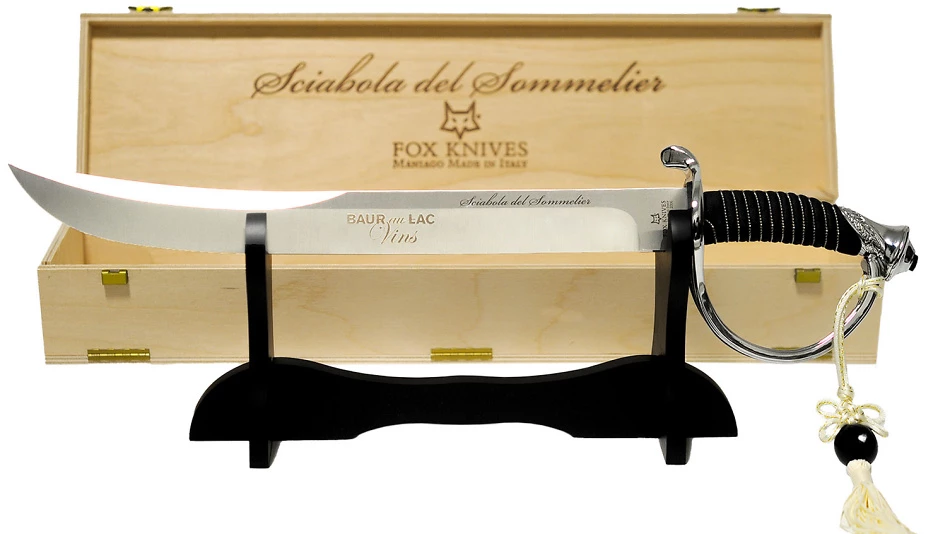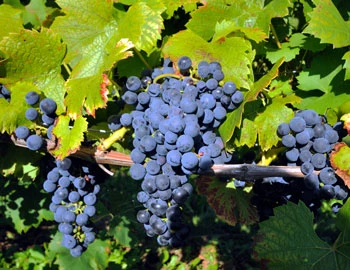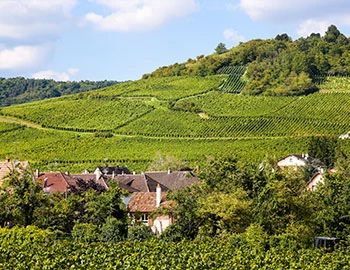
Nicolas Feuillatte Palmes d'Or Rosé Millésime 2006
AOC Champagne, 750 ml

| Grape variety: | Pinot noir |
| Producer: | Nicolas Feuillatte |
| Origin: | France / Champagne |
| Other vintages: |
Description
The first impression right from the start: Outstanding! Complex aromas of wild hibiscus blossoms, baroque tea roses, pickled cherries, a hint of raspberry spirit and port wine, ripe orange, cardamom, sumac, cinnamon, toasted almond and some tobacco. Fine pearls surround the striking structure. On the palate complex, juicy and fine, elegant tannins. A generous aromatic fan of apples, blood oranges, cherry stick, raspberry jelly, tamarind, balsamic notes and some anise and pepper. An independent and opulent champagne of the luxury class in every aspect.
Celebrate the Art of Sabring!

With its elegant design, this champagne sabre is not only an impressive eye-catcher at any celebration and an indispensable tool for stylish sabering, but also the perfect gift for all passionate sparkling wine lovers.
Attributes
| Origin: | France / Champagne |
| Grape variety: | Pinot noir |
| Ripening potential: | 6 to 20 years |
| Drinking temperature: | 10 to 12 °C |
| Food Pairing: | Vegetable cous-cous, Goat's cheese, Moroccan specialities, Fruit tart, Châteaubriand, Filet Wellington, Wild fowl |
| Vinification: | soft pressing, bottle fermentation |
| Harvest: | hand-picking with simultaneous grape sel, strict selection, in small boxes |
| Maturation: | on the yeast, long cultivation |
| Volume: | 12.0 % |
| Note: | Contains sulphites |
Nicolas Feuillatte
Nicolas Feuillatte, a visionary and gifted entrepreneur, presented his Champagne for the first time in 1976. It quickly became the trendy brand in jet-setter circles in the USA, Australia and England, circles which Nicolas Feuillatte regularly frequented. In just 30 years, Nicolas Feuillatte rose to become the No. 1 Champagne brand in France.
Behind the brand lie numerous wine growers and their families, lovingly tending their vineyards with the experience of generations to obtain the best quality grapes for the harvest. They are organised within the Centre Vinicole de la Champagne, the most important wine growers’ association in Champagne. The vineyards include 13 invaluable Grand Cru and 33 1er Cru areas, the basis for exclusive and prestigious top cuvées such as Palmes d'Or Brut and Palmes d'Or Rosé. In order to ensure flawless quality, the grapes – regardless of origin – are pressed immediately after harvesting in on-site presses in the vineyards themselves.

Pinot noir
Blueprint of the terroir
No other variety expresses its terroir as precisely as Pinot noir. It is a sensitive, fragile grape. But when it succeeds, it gives the world some of its very greatest wine plants. It especially excels in Burgundy, where it has been cultivated for at least 700 years. Even in the middle ages, it was considered so precious that it was kept separate from other grapes so as to not diminish its value. The finest examples are delicate and fragrant with aromas of cherries and red berries. With maturity, notes of forest floor, leather and truffles enter as well. An irresistible fruity sweetness still shines through, even after several decades. The Pinot noir does well in cool locations: in Switzerland and in Germany, where it is known as Blauburgunder and Spätburgunder respectively; in Alsace and in South Tyrol, in Oregon, New Zealand and Tasmania. Not least, it yields fantastic champagnes. It is a wonderful culinary companion. With its soft tannins and charming bouquet, it meshes with everything, from Güggeli and cheeses to fried fish.

France
France – Philosophy in a bottle
According to French philosophy, wine should be an expression of the soil and climate. They use the word “terroir” to describe this. Terroir makes every wine different, and many especially good. French wine is regarded worldwide as an expression of cultural perfection. The French believe that humans are responsible for the quality of the berries, the vine variety for their character, and nature for the quantity. This philosophy can be expressed succinctly as: “the truth is the vineyard, not the man.”


